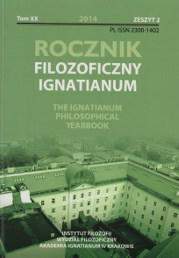Review of "An Inquiry into Modes of Existence. An Anthropology of the Moderns" by Bruno Latour
Abstrakt
Recenzja książki Bruno Latoura "An Inquiry into Modes of Existence. An Anthropology of the Moderns"
Bibliografia
Bryant LR (2011), "The Democracy of Objects" Ann Arbor Open Humanities Press.
Deleuze G (1995 (1990)), "Letter to a Harsh Critic", In Negotiations: 1972-1990. New York , pp. 3-12. Columbia University Press.
Descartes R (2009), "Méditations métaphysiques" Paris GF Flammarion.
Elam M (1999), "Living Dangerously with Bruno Latour in a Hybrid World", Theory, Culture and Society. Vol. 16(4), pp. 1-24.
Hacking I (2002), "Historical ontology" Cambridge, London Harvard University Press.
Harman G (2002), "Tool-Being. Heidegger and the Metaphysics of Objects" Peru, Illinois Carus Publishing Company.
Heidegger M (1998), "Zijn en Tijd" Amsterdam SUN --- Kritak.
Kockelmans A (1962), "Martin Heidegger" Tielt en Den Haag Uitgeverij Lannoo.
Latour B (2013), "An Inquiry into Modes of Existence. An anthropology of the moderns" Cambridge Harvard University Press.
Latour B (2013), "Immanence"
Latour B (2011), "Reflections on Etienne Souriau’s Les différents modes d’existence", In The Speculative Turn: Continental Materialism and Realism. Melbourne , pp. 304-333. repress.
Latour B (2007), "Can We Get Our Materialism Back, Please?", Isis. Vol. 98(1), pp. 138-142.
Latour B (2003), "The promises of constructivism", In Chasing Technoscience: Matrix of Materiality. Bloomington , pp. 27-46. Indiana University Press.
Latour B (2000), "When things strike back: a possible contribution of >>science studies<< to the social sciences", British Journal of Sociology. Vol. 51(1), pp. 105-123.
Latour B (1999), "Pandora’s Hope: Essays on the Reality of Science Studies" Cambridge, London Harvard University Press.
Latour B (1993), "We Have Never Been Modern" Cambridge Harvard University Press.
Latour B (1991), "Technology is Society Made Durable", In Sociology of Monsters: Essays on Power, Technology, and Domination. London , pp. 103-133. Routledge.
Latour B (1988), "A Relativistic Account of Einstein’s Relativity", Social Studies of Science. Vol. 18(1), pp. 3-44.
Latour B (1988), "Comments on >>The Sociology of Knowledge about Child Abuse<<", Nous. Vol. 22, pp. 67-69.
Latour B (1988), "The Pasteurization of France" Cambridge Mass., London Harvard University Press.
Latour B (1987), "Science in Action. How to follow scientists and engineers through society" Cambridge Harvard University Press.
Latour B and Woolgar S (1979), "Laboratory Life. The Construction of Scientific Facts" Princeton, New Jersey Princeton University Press.
Law J (2012), "ANT and politics: working in and on the world"
Mol A (2002), "The Body Multiple: Ontology in Medical Practice" Durham Duke University Press.
Nietzsche F (1992), "De vrolijke wetenschap" Amsterdam Uitgeverij de Arbeiderspers.
Nowak AW (2013), "Ontological Imagination: transcending methodological solipsism and the promise of interdisciplinary studies", AVANT. Vol. 4(2), pp. 169-193.
Shapin S and Schaffer S (1985), "The Leviathan and the Air-Pump: Hobbes, Boyle, and the Experimental Life" Princeton, New Jersey Princeton University Press.
Sokal A and Bricmont J (1999), "Intellectueel bedrog. Postmodernisme, wetenschap en antiwetenschap" Breda EPO/De Geus.
Rocznik przyjmuje do druku wyłącznie materiały, które nie wchodzą w żaden konflikt interesów, żaden konflikt z prawem autorskim itp. Redakcja prowadzi działania przeciw: plagiatom, ghostwriting1, guest/honorary authorship2 itp. Autor pracy zbiorowej, który jest pierwszy na liście, bierze na siebie odpowiedzialność i ma obowiązek przedstawić wkład wszystkich współautorów. Jeśli publikacja powstała dzięki dedykowanym środkom finansowym, należy ujawnić to np. w Podziękowaniu, przypisie itp. Ew. przedruki wymagają jawnego zgłoszenia i okazania odpowiedniego pozwolenia wydawniczego. Autorzy / Recenzenci nierzetelni narażają się na reakcję właściwą stosownym instytucjom.
______
1 Ma to miejsce, gdy osoba mająca istotny wkład jest pominięta na liście Autorów czy w Podziękowaniu.
2 Zachodzi, gdy na liście autorskiej pojawia się osoba mająca znikomy/żaden udział w pracy.





